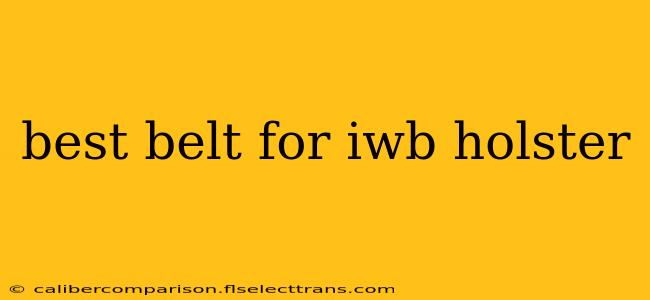Choosing the right belt for your IWB (Inside the Waistband) holster is crucial for comfort, safety, and effective concealed carry. A flimsy belt will allow your holster and firearm to shift, compromising your concealment and potentially causing injury. This guide will help you navigate the options and find the best belt for your specific needs.
Understanding the Importance of a Sturdy Belt for IWB Carry
Unlike carrying a wallet or keys, an IWB holster carries a significant amount of weight – your firearm. A supportive belt is not merely an accessory; it’s a foundational piece of your concealed carry system. A quality belt provides the necessary rigidity to:
- Maintain Holster Position: A stiff belt prevents the holster from sagging or shifting, keeping your firearm consistently in place. This is vital for quick and efficient access while minimizing printing (the outline of the firearm showing through your clothing).
- Enhance Concealment: By keeping the holster stable, a good belt contributes significantly to better concealment. Sagging or movement draws unwanted attention to your firearm.
- Improve Comfort: A properly fitted, sturdy belt distributes the weight of your firearm more evenly, preventing discomfort and fatigue, especially during prolonged wear.
- Ensure Safety: A secure belt prevents accidental shifting or dropping of your firearm, enhancing your overall safety.
Key Features of a High-Quality IWB Holster Belt
Several key features distinguish a high-quality IWB holster belt from an ordinary one:
1. Material:
- Genuine Leather: Offers exceptional durability, comfort, and a natural break-in period that molds to your body. Higher-quality leather belts are more expensive but provide superior longevity and support.
- Nylon/Webbing: A more affordable option, nylon belts are known for their strength and water resistance. Look for reinforced stitching and a substantial thickness for optimal support.
- Hybrid Belts: Combine leather and nylon or other materials for a blend of comfort, durability, and affordability.
2. Stiffness/Rigidity:
The belt's stiffness is paramount. It needs to be rigid enough to support the weight of your firearm and holster without bending or flexing. Too stiff, however, can be uncomfortable. Look for belts designed specifically for concealed carry, which strike a balance between rigidity and comfort.
1.5-inch or 1.75-inch Width:
Most IWB holsters are designed to work best with belts in this width range. These wider belts provide more stability and distribute the weight more effectively than narrower belts.
3. Buckle Type:
- Solid Core Buckles: More durable and less likely to break under stress compared to plastic buckles.
- Coated Buckles: Can reduce wear and tear on clothing.
4. Belt Loops/Attachments:
Check whether your holster has specific attachment requirements. Some holsters require specific belt loops or attachment points to ensure a secure fit.
Types of Belts for IWB Holsters:
- Gun Belts: Specifically designed for carrying firearms, these belts prioritize stiffness and durability.
- Hybrid Belts (Leather/Nylon): Offer a combination of comfort and strength.
- Reinforced Webbing Belts: A robust and durable option made from heavy-duty nylon or other synthetic materials.
Choosing the Right Belt for You:
Consider your body type, firearm size and weight, and your lifestyle when choosing a belt. A larger firearm will require a stiffer belt than a smaller one. If you plan on wearing your IWB holster daily, prioritize comfort. If you prioritize durability above all else, invest in a high-quality leather gun belt.
Remember to measure your waist accurately to ensure a proper fit. A belt that's too loose won't provide adequate support, while one that's too tight will be uncomfortable and potentially restrict blood flow.
Conclusion:
Investing in a high-quality IWB holster belt is an investment in your safety and comfort. Consider the factors discussed above and choose a belt that meets your individual needs and preferences. The right belt will make a significant difference in your concealed carry experience.

